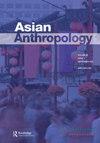挑战台湾澎湖的风能财富来源——关于风的物质纠缠人类学
Q2 Social Sciences
引用次数: 0
摘要
摘要台湾澎湖的许多居民拒绝投资当地政府寻求开发的风电作为稳定的财富来源,因为他们认为当地风是独特但具有破坏性的。利用风能的“纠缠物质性”概念——其流动性及其与他人联系和对他人采取行动的能力——本文探讨了当地风能如何以及为什么在人们决定不投资风能方面发挥了关键作用。这表明,当地人怀疑风能作为一种绿色商品的价值和可行性,因为他们认为,形成和携带咸雨(咸雨,盐和海水滴的结合)的风会导致腐蚀和故障,从而损害风力涡轮机的生产力。因此,本文认为,风能是一种矛盾的基础设施,它既允许又阻止风力涡轮机的正常运行,同时使资本主义对风能的期望变得可行又不可行。因此,它有助于重新思考我们对自然作为基础设施的理解,并将风能及其作用置于风能社会分析的中心阶段,而风能是土地和领土化问题所占据的位置。本文章由计算机程序翻译,如有差异,请以英文原文为准。
Challenging wind power as a source of wealth in Penghu, Taiwan: toward an anthropology of wind's entangling materiality
Abstract Many residents of Penghu, Taiwan refused to invest in wind power that the local government sought to develop as a stable source of wealth because of their conception of local winds as unique but destructive. Using the notion of wind’s “entangling materiality”—its fluidity and its capacities to connect with others and act on others—this article examines how and why the local wind played a pivotal role in people deciding not to invest in wind power. It demonstrates that the locals doubted the value and viability of wind power as a green commodity, as they believed that the winds that shape and carry xianyu (salty rain, a combination of salt and seawater droplets) would damage the productivity of wind turbines by causing corrosion and breakdown. This article therefore argues that wind operates as an ambivalent infrastructure that simultaneously allows and prevents the proper functioning of wind turbines while rendering workable and unworkable capitalist expectations for wind power. It thus contributes to rethinking our understanding of nature as infrastructure and places the wind and what it does at center stage in the social analysis of wind power, a place that land and territorialization issues have occupied.
求助全文
通过发布文献求助,成功后即可免费获取论文全文。
去求助
来源期刊

Asian anthropology
Social Sciences-Anthropology
CiteScore
1.60
自引率
0.00%
发文量
25
期刊介绍:
Asian Anthropology seeks to bring interesting and exciting new anthropological research on Asia to a global audience. Until recently, anthropologists writing on a range of Asian topics in English but seeking a global audience have had to depend largely on Western-based journals to publish their works. Given the increasing number of indigenous anthropologists and anthropologists based in Asia, as well as the increasing interest in Asia among anthropologists everywhere, it is important to have an anthropology journal that is refereed on a global basis but that is editorially Asian-based. Asian Anthropology is editorially based in Hong Kong, Taiwan, and Japan, but welcomes contributions from anthropologists and anthropology-related scholars throughout the world with an interest in Asia, especially East Asia as well as Southeast and South Asia. While the language of the journal is English, we also seek original works translated into English, which will facilitate greater participation and scholarly exchange. The journal will provide a forum for anthropologists working on Asia, in the broadest sense of the term "Asia". We seek your general support through submissions, subscriptions, and comments.
 求助内容:
求助内容: 应助结果提醒方式:
应助结果提醒方式:


